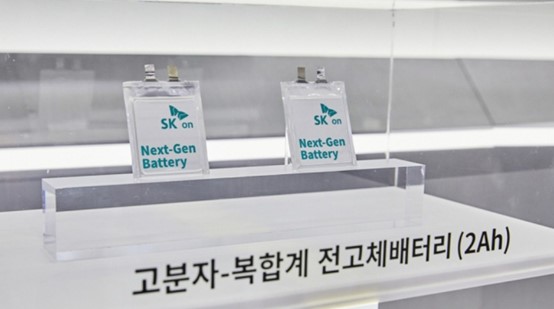Recently, SK On announced that it has successfully co-developed a new polymer electrolyte for lithium metal batteries, known as "SIPE" (single-ion conducting polymer electrolyte), which operates at room temperature and is expected to enhance the performance of solid-state batteries and accelerate the development of all-solid-state batteries. This development was achieved in collaboration with the research team led by the late Professor John B. Goodenough from the University of Texas. The study has been published in the prestigious Journal of Electrochemical Society.
Professor Goodenough, a pioneer in battery technology, doubled the capacity of lithium-ion batteries. In 2019, at the age of 97, he was awarded the Nobel Prize in Chemistry, setting a record as the oldest Nobel laureate. Since 2020, he had been working with SK On on the development of "solid electrolytes" for lithium metal batteries until his passing last June, after which Professor Khani took over the research team.
Polymer electrolytes are considered the next generation of solid-state battery materials that are cost-effective and easy to manufacture. However, compared to oxide and sulfide-based electrolytes, they have lower ionic conductivity, which means they typically only function at high temperatures of 70-80°C. Overcoming this limitation is one of the main challenges in this field.
SIPE addresses this issue by increasing ionic conductivity and the number of lithium ion transfers. Compared to existing polymer electrolytes, SIPE's room temperature ionic conductivity has been increased by approximately ten times (1.1×10^-4S/cm), and the lithium ion transfer number has increased from 0.2 to 0.92, nearly five times. These improvements enable it to operate at room temperature.
The higher ionic conductivity and lithium ion transfer number also enhance battery output power and fast-charging performance. Experimental results released by SK On show that batteries with SIPE maintained 77% of their discharge capacity during high-speed charging and discharging (2C) compared to low-rate charging and discharging (0.1C). Solid electrolytes typically suffer significant capacity loss during high-speed charging due to low ionic conductivity, but SIPE minimizes this issue.
It is noteworthy that the stability of the solid electrolyte interphase (SEI) has been improved to suppress dendrite formation. Lithium metal batteries can significantly increase energy density by using metallic lithium instead of graphite as the cathode. However, resolving the persistent dendrite issue is essential for commercialization.
Additionally, SIPE has high mechanical durability, making mass production possible. It also has excellent thermal stability, capable of withstanding temperatures above 250°C. When applied to next-generation hybrid solid-state batteries, it is expected to improve charging speed and low-temperature performance.
Kim Tae-kyung, head of SK On's Next Generation Battery R&D Office, stated that based on the results of this research, it is expected to accelerate the development of solid-state batteries applying polymer electrolytes.
SK On is developing two types of all-solid-state batteries: polymer oxide composite materials and sulfide batteries. The goal is to produce pilot prototypes by 2025 and 2026, respectively, and commercial prototypes by 2028 and 2029. The company's battery research institute in Daejeon, South Korea, is currently constructing a next-generation battery pilot plant based on sulfides, which is expected to be completed in the second half of next year.
SK On has strengthened its cooperation with the American solid-state battery company Solid Power earlier this year.







